Introduction
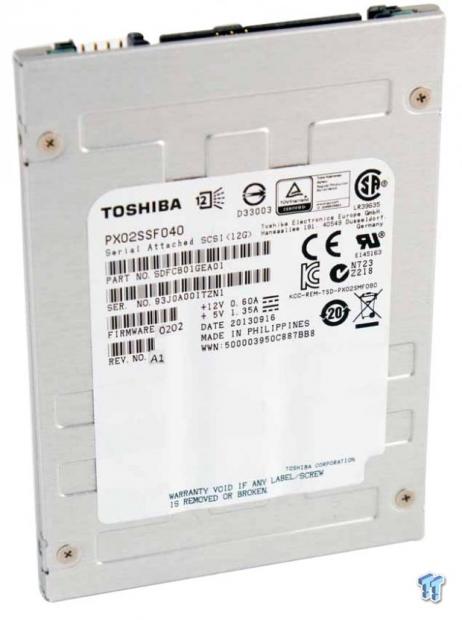
Toshiba's recent acquisition of OCZ was a strategic investment. OCZ offers controller technology, a known brand, and marketing channels for client products. What followed was surprising. Instead of a rash of new products from OCZ, we were greeted by several announcements of new Toshiba designs. The new Toshiba PX02SS is another new entrant that rounds out Toshiba's enterprise product stack by fulfilling the demanding role of a heavy workload workhorse.
The PX02SS comes in the familiar 2.5-inch form factor and most notably features a 12Gb/s SAS3 connection. While the lower-endurance versions of the PX02 scale up to a maximum capacity of 1.6TB, the heavily overprovisioned PX02SS tops out at 800GB with a 15mm z-height. The smaller 100GB, 200GB, and 400GB capacities feature a slim 7mm case.
The PX02SS drive occupies the upper echelon of a four-tiered enterprise SSD product stack from Toshiba. The SAS3 PX02SM, evaluated here, provides similar characteristics with less endurance. The SAS3 PX03SN and SATA THNSNJ provide read-centric solutions for low-write-duty environments.
The PX02SS brings an impressive helping of random speed, providing 130,000/42,000 random read/write IOPS. Random speed is matched by an equally impressive 1,100 MiB/s in sequential read, but a slightly lower 410 MiB/s of sequential write speed sticks out on the spec sheet. The PX02SS is designed specifically for heavy write workloads in transactional environments; this lower sequential write performance will not have a significant impact on performance in its typical use-case.
Dual-port SAS provides multipath and failover capabilities for an SSD that delivers impressive performance and endurance. Toshiba leverages its proprietary Quadruple Swing by Code, a layered ECC system, to provide protection for user data. Power capacitors provide enough capacitance to flush data to the NAND in the event of host power loss. Toshiba covers the bases for data security compliance with available security models.

The read-oriented PX02SM also features the same 24nm eMLC NAND utilized on the PX02SS, but there is a smaller allocation of overprovisioning. The hefty 156 percent dose of extra overprovisioning on the PX02SS enables superior random write speed and a massive increase in endurance. The PX02SS features endurance ratings of 30 Drive Writes Per Day (DWPD). This endurance typically isn't seen outside of SLC products. The HGST SSD800MM clearly outpaces the PX02SS in a few performance metrics, but it falls short in endurance comparisons. The tremendous endurance of the PX02SS is a big differentiator among the current crop of 12Gb/s SSDs.
One indicator of this tremendous resilience is the rating of 5.4 PB of write endurance, measured per the JEDEC standard, for a 100GB SSD. This is an outstanding amount of endurance for such a small product, and it is nearly double the endurance of other competing solutions that feature twice the capacity. One could imagine these small volumes making their way into HDD caching solutions, a place where a small amount of flash can have a big impact on storage performance.
The Toshiba PX02SS offers the standard five-year warranty available with most enterprise SSD products. Today, we will compare it to the HGST SSD800M and its very similar PX02SM companion.
Toshiba PX02SS Internals and Specifications
Toshiba PX02SS Internals


The 800GB versions come with a 15mm z-height. The case is constructed of a lightweight metal alloy and features the relevant branding. The top of the case also holds a recessed series of indentations that function as heat channels. The rear of the case has a metal recessed area, and we note a square hole, and several round ones, on the bottom of the SSD to allow heat to flow from the interior of the case.


The thermal characteristics of the heat channels become clear when we open the case of the SSD. There are small thermal pads that mate with the NAND and DRAM to wick heat away from these components. The pads are present on both sides of the case. Four small thermal pads mate with the top of the controller and another four connect to the PCB on the rear of the controller. We usually observe large thick thermal pads that cover entire banks of NAND in many enterprise SSDs. In this type of 'open' case design, this could impede internal airflow.


There is a SK Hynix DRAM module on both sides of the PCB. The large controller dominates the middle of the PCB. There are eight 64GB 24nm eMLC NAND packages (8k page) on both the top and bottom of the PCB with eight 64Gb die per package. This gives us 1024GB of raw NAND, only 400GB of which is user-addressable. A total of 34 power capacitors protect from host power loss.
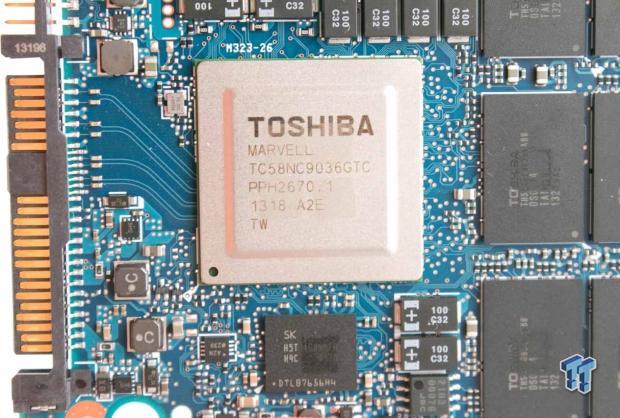
The Marvell TC58NC9036GTC controller utilizes custom Toshiba firmware.
Toshiba PX02SS Specifications
The PX02SS has static random performance specifications with all capacity points, but the 800GB model takes a small hit in sequential read speed. There is 1GB of DRAM caching on the 800GB, 256MB for the 200GB, and 512MB for the 400GB model.
The PX02SS is compatible with 6Gb/s and 12Gb/s SAS3 dual-port connections. The full-duplex 12Gb/s SAS connection features multi-path ability for failover redundancy to ensure no single point of failure. The drive features a read error rate of less than one LBA per 10^17 bits transferred and an MTBF of two million power-on hours.
Power loss protection is built-in with a bank of tantalum capacitors to flush data in transit down to the NAND in the event of a power failure. The energy efficiency is 19,500 IOPS-per-Watt for the 400GB model, though this is measured as read IOPS-per-Watt. The PX02SS features up to 30 drive writes per day (DWPD) of endurance. There are also versions supporting SANITIZE Instant erase available, but they come with a notable 190 MiB/s decrease in sequential read speed.

Test System and Methodology


We utilize a new approach to HDD and SSD storage testing for our Enterprise Test Bench that is designed specifically to target long-term performance with a high level of granularity. Many testing methods record peak and average measurements during the test period. These average values give a basic understanding of performance, but they fall short in providing the clearest view possible of I/O Quality of Service (QoS).
'Average' results do little to indicate performance variability experienced during actual deployment. The degree of variability is especially pertinent as many applications can hang or lag as they wait for I/O requests to complete. This testing methodology illustrates performance variability and includes average measurements during the measurement window.
While under load, all storage solutions deliver variable levels of performance. While this fluctuation is normal, the degree of variability is what separates enterprise storage solutions from typical client-side hardware. Providing ongoing measurements from our workloads with one-second reporting intervals illustrates product differentiation in relation to I/O QoS. Scatter charts give readers a basic understanding of I/O latency distribution without directly observing numerous graphs.
Consistent latency is the goal of every storage solution, and measurements such as Maximum Latency only illuminate the single longest I/O received during testing. This can be misleading as a single 'outlying I/O' can skew the view of an otherwise superb solution. Standard Deviation measurements consider latency distribution, but they do not always effectively illustrate I/O distribution with enough granularity to provide a clear picture of system performance. We utilize high-granularity I/O latency charts to illuminate performance during our test runs.
Our testing regimen follows SNIA principles to ensure consistent, repeatable testing. We measure power consumption during precondition runs. This provides measurements in time-based fashion, with results every second, to illuminate the behavior of power consumption in steady-state conditions. Power consumption can cost more over the life of the device than the initial acquisition price of the hardware itself, which significantly affects the TCO of the storage solution. We also present IOPS-to-Watts measurements to highlight efficiency.
Our test pool features SSDs of varying capacity, and it is important to bear this in mind when viewing results. The Toshiba PX02SS and PX02SM feature static performance specifications among their different capacity points. This should provide a fair representation of performance in comparison to the HGST SSD800MM. The first page of results will provide the 'key' to understanding and interpreting our new test methodology.
4k Random Read/Write

We precondition the Toshiba PX02SS for 9,000 seconds, or two and a half hours, receiving reports on several parameters of workload performance every second. We then plot this data to illustrate the drive's descent into steady state.
This chart consists of 18,000 data points. This is a dual-axis chart with the IOPS on the left and the latency on the right. The red dots signify IOPS during the test, and the grey dots are latency measurements during the test period. We place latency data in a logarithmic scale to bring it into comparison range. The lines through the data scatter are the average during the test. This type of testing presents standard deviation and maximum/minimum I/O in a visual manner.
Note that the IOPS and Latency figures are nearly mirror images of each other. This illustrates that high-granularity testing can give our readers a good feel for latency distribution by viewing IOPS at one-second intervals. This should be in mind when viewing our test results below.
This downward slope of performance happens very few times in the lifetime of the device, typically during the first few hours of use, and we present the precondition results only to confirm steady-state convergence.

Each level tested includes 300 data points (five minutes of one second reports) to illustrate performance variability. The line for each OIO depth represents the average speed reported during the five-minute interval. 4k random speed measurements are an important metric when comparing drive performance as the hardest type of file access for any storage solution to master is small-file random. One of the most sought-after performance specifications, 4k random performance is a heavily marketed figure.
The Toshiba PX02SS averages 117,289 IOPS with a 4k random read workload at 256 OIO (Outstanding I/O), but its peak is at 32 OIO where it delivers an outstanding 133,871 IOPS. The Toshiba PX02SM averages an impressive 124,550 IOPS. The HGST peaks at 256 OIO with 149,352 IOPS. Perhaps the only chink in the vaunted HGST SSD800MM's armor comes at 128 OIO, which is where it experiences a drop in performance. We conducted multiple tests with several measuring tools to affirm this odd occurrence, and it can likely be fixed with a firmware update.

The PX02SS and PX0SMF provide the best performance-v-latency at 32 OIO, while the HGST thrives at the higher 256 OIO.

Garbage collection routines are more pronounced in heavy write workloads. This leads to more variability in performance. We can see the benefits of the increased overprovisioning with the PX02SS providing 45,786 IOPS at 256 OIO and the PX02SM trailing at 28,602 IOPS. The PX02SM and PX02SS have the same controller and DRAM configuration; much of this performance increase is due to the increased overprovisioning. The HGST averages a stellar 64,279 IOPS at 256 OIO.

The PX02SS does not suffer nearly as much variability as the lower-tier PX02SM and seems to fall into the best performance at 64 OIO.

Our write percentage testing illustrates the varying performance of each solution with mixed workloads. The 100 percent column to the right is a pure write workload of the 4k file size, and 0 percent represents a pure 4k read workload.
The PX02SS clearly exhibits a performance advantage over its sibling as we hit heavier write workload percentages.

We record the power consumption measurements during our precondition run. We calculate the stated average results during the last five minutes of the test, after the device has settled into steady state.
The PX02SS averages 5.85 watts during the measurement window, and the HGST provides a higher average of 7.56 watts.

IOPS-to-Watts measurements are generated from data recorded during our precondition run, and the stated average is from the last five minutes of the test.
The Toshiba PX02SS averages 7,869 IOPS-per-Watt, while the HGST leads with 8,977. It is important to note the IOPS-per-Watts set forth in the specifications of both drives is with read activity. We measure IOPS-per-Watt with write activity.
8k Random Read/Write


8k random read and write speed is not tested for consumer use, but for enterprise environments, this is an important aspect of performance. With several different workloads relying heavily upon 8k performance, we include this as a standard with each evaluation. Many of our Server Emulations below will also test 8k performance with various mixed read/write workloads.
The average 8k random read speed of the Toshiba PX02SS measures an outstanding 100,277 IOPS at 256 OIO, while the Toshiba PX02SM takes the low road with 88,549 IOPS. The HGST falls into the middle of the pack with 91,622 IOPS.
This excellent tuning for 8k performance is key to performance in many enterprise workloads, particularly the transactional environments the PX02SS is designed for.

All three SSDs exhibit a tight latency range during the 8k random read test.

The PX02SS experiences significant variability while managing an average of 29,714 IOPS at 256 OIO. The PX02SM provides less variability, but it also provides a lower average of 16,391 IOPS at 256 OIO. The HGST leads the group with a very consistent average of 32,878 IOPS at 256 OIO.

Both Toshiba SSDs experience significant latency variability, particularly with the heavier workloads. The PX02SS's redeeming quality is the much lower latency results that bring the average down.

The 8k mixed test reveals exactly why we target different write mixtures. As our testing has already revealed, the PX02SS dominated the 8k read category, but it fell to the HGST in the write testing. However, we find a diamond in the rough with the PX02SS as it dominates the middle of this chart. The mixed 8k performance of the PX02SS, though it does suffer some variability, is an obvious strength of the drive. This superb performance in the mixed 8k workloads should translate directly to our server workloads, which is where we dive into mixed 8k workloads with more granularity.

Power consumption for the PX02SS averages 5.84 watts during the measurement window, and the HGST requires 7.60 watts.

The PX02SS leads in the efficiency test with an average of 5,103 IOPS-per-Watt, while the HGST measures 4,159 IOPS-per-Watt.
128k Sequential Read/Write


128k sequential speed reflects the maximum sequential throughput of the SSD using a realistic file size encountered in an enterprise scenario. The Toshiba PX02SS goes toe-to-toe with the HGST SSD800MM in sequential read speed as both deliver a blistering average of 1,040 and 1,056 MiB/s, respectively. The PX02SM is within its expectations at 812 MiB/s.

Latency testing reveals very little latency variation with sequential read activity for all three SSDs.

The HGST absolutely dominates the sequential write testing with a blistering average of 702 MiB/s. The two Toshiba models score slightly over their rated speed at 417 MiB/s.

The faster speed of the HGST SSD800MM leads to significantly lower latency than that of the competing Toshiba models.

The percentage testing gives us another deeper perspective of the performance of the Toshiba drives. While the HGST provides excellent performance across the board, it actually loses more than half of the chart. In mixed read/write environments, we witness the PX02SS having a distinct advantage on the more read-centric mixtures until we hit a 70 percent mix. The HGST drops tremendously from 0 percent read (100 percent write) to the 10 percent mixture, while the Toshiba has a more graceful descent across the chart. This gives the Toshiba a win in seven of the categories, while the HGST mops up the remaining four.

The PX02SS averages 6.08 watts, and the HGST requires 8.68 watts for the sequential write workload.

The PX02SS averages 88 MiB/s-per-Watt, while the HGST provides 80 MiB/s-per-Watt.
Database/OLTP and File Server
Database/OLTP


This test emulates Database and On-Line Transaction Processing (OLTP) workloads. OLTP is the processing of transactions such as credit cards and high frequency trading in the financial sector. Enterprise SSDs are uniquely well suited for the financial sector with their low latency and high random workload performance. Databases are the bread and butter of many enterprise deployments. These are demanding 8k random workloads with a 66 percent read and 33 percent write distribution that can bring even the highest performing solutions down to earth.
The Toshiba PX02SS averages 60,240 IOPS at 256 OIO, and the PX02SM averages 43,127 IOPS. The HGST SSD800MM averages 52,630 IOPS. One area the HGST excels is performance consistency.

The Toshiba PX02SS experiences less inconsistency than the PX02SM, while the HGST continues to operate within a very tight latency envelope.

The Toshiba averages 6.44 watts, and the HGST requires 5.87 watts.

The PX02SS averages 9,075 IOP-per-Watt, and the HGST SSD800MM averages 8,670.
File Server


The File Server profile represents typical file server workloads. This profile tests a wide variety of different file sizes simultaneously, utilizing an 80 percent read and 20 percent write distribution.
The PX02SS averages 55,288 IOPS, the PX02SM averages 42,653 IOPS, and the HGST averages 38,737 IOPS at 256 OIO.


The PX02SS requires 6.40 watts during the file server workload, and the HGST pulls 5.26 watts.

The Toshiba PX02SS leads this test easily with an impressive 8,693 IOPS-per-Watt, compared to 6,502 for the HGST SSD800MM.
Email Server


The Email Server profile is a very demanding 8k test with a 50 percent read and 50 percent write distribution. This application is indicative of the performance of the solution in heavy write workloads.
The PX02SS averages 51,119 IOPS at 256 OIO, and the HGST is close behind at 44,804 IOPS. The PX02SM trails by a large margin with 30,572 IOPS.

One area the HGST continues to shine is the consistent latency performance, though we note a big improvement from the PX02SM to the PX02SS.
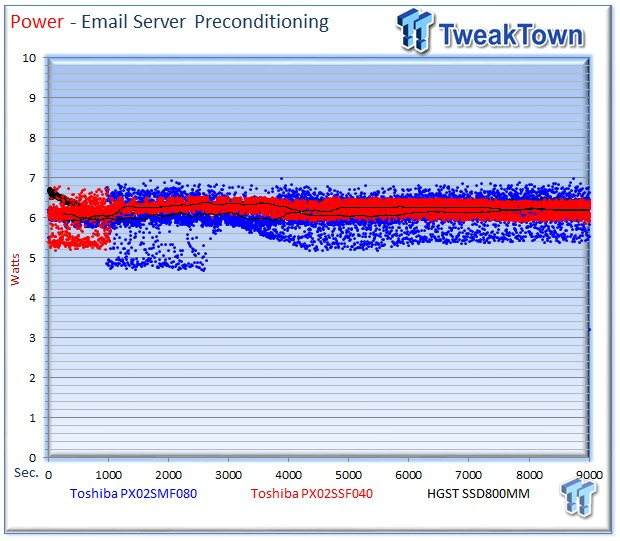
The PX02SS averages 6.21 watts in steady state, compared to 6.36 watts for the HGST SSD. The values are so close that the PX02SS covers the HGST results.
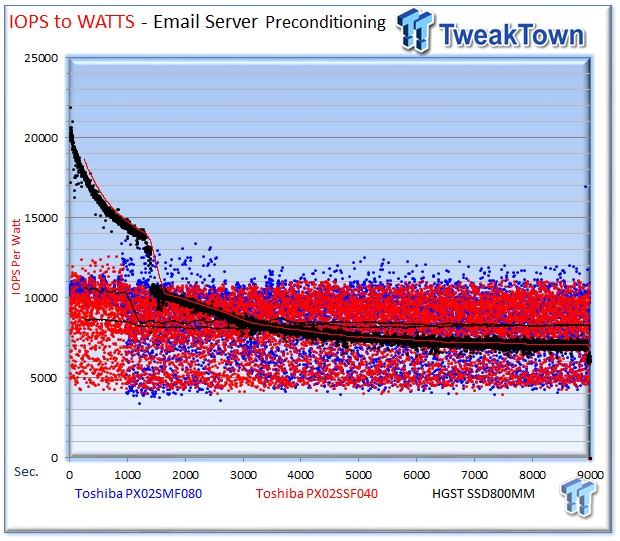
The PX02SS closes out our testing with an impressive 8,259 IOPS-per-Watt, ahead of the 6,970 IOPS from the HGST.
Final Thoughts
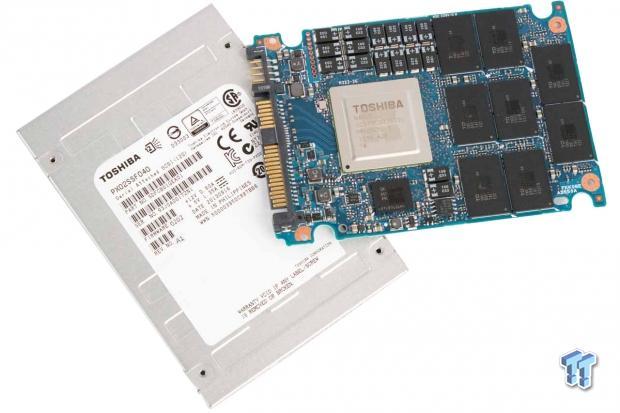
Toshiba's latest entrant into their SSD lineup makes great gains in endurance, performance, and consistency. The strength of the existing products in Toshiba's SSD enterprise portfolio will be bolstered when they incorporate OCZ's new controller technology into future products. One of the great benefits of the OCZ acquisition is the PCIe SSD offerings they bring to the table, but Toshiba's own existing 2.5-inch enterprise SSD segment is already a strong asset.
There are a complex mix of factors in every SSD purchasing decision. The warranty, encryption, and power fail protection bases are covered by the Toshiba PX02SS, and its endurance is unmatched by other 12Gb/s SSDs. A perfect example is the astounding 5.4PB endurance provided by the 100GB capacity point. The PX02SS series delivers static performance specifications across all capacities, while some SSDs are slower with smaller SSDs. This gives the PX02SS a clear advantage at lower capacities. The endurance of the PX02SS is a big selling point, and it is one that clearly destines the Toshiba flagship for the most demanding write-intensive workloads.
The Toshiba PX02SS excels in most of its standard performance tests, though it is outstripped in random 4k read/write speed by the HGST SSD800MM. Moving to the 8k testing brings the PX02SS into its comfort zone, where it tops the charts with an unmatched 100,000 random read IOPS. In random 8k write performance, the PX02SS also shines, delivering an average speed just shy of the performance from the HGST.
Pure read and write testing does not always tell the whole story, and a look at the mixed random 8k workloads reveals impressive performance from the Toshiba PX02SS; it leads nine of the 11 mixed 8k workloads. This is an important metric; many applications lean heavily on 8k performance.
Moving on to sequential performance, the PX02SS ties the HGST in sequential read performance, but it trails behind in sequential write performance; the SSD800MM nearly doubles its performance. The slower sequential speed of the PX02SS is a dark spot on an otherwise spotless resume. In fairness, an SSD designed for transactional environments will not likely be subjected to excessive sequential write workloads. In our mixed sequential testing, we again found an advantage for the PX02SS; it bested the HSGT in many of the mixed 128K workloads.
The PX02SS likes to play in mixed workloads and handles them well, and this translated over to our server emulations. While the PX02SS sports high average performance, one area we would like to see improvement is in performance consistency. The HGST delivers a much tighter range of performance.
Things aren't always as clear-cut as they appear, and every drive is going to have advantages and disadvantages. Both SSDs have strengths and weaknesses, and pricing will be a deciding factor in many cases. The Toshiba PX02SS is clearly purpose-built for transactional environments, and it delivers unmatched performance in mixed workloads and a staggering amount of endurance, meriting the TweakTown Best Features award.

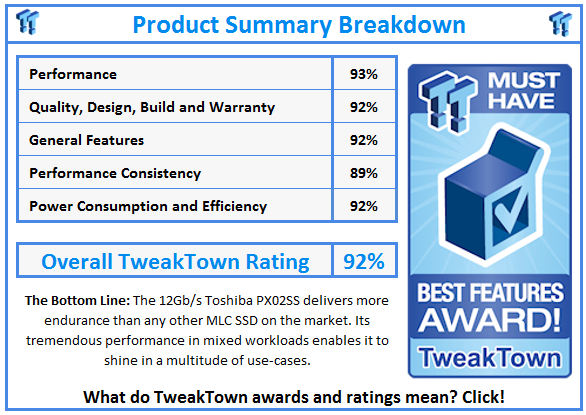
 United
States: Find other tech and computer products like this
over at
United
States: Find other tech and computer products like this
over at  United
Kingdom: Find other tech and computer products like this
over at
United
Kingdom: Find other tech and computer products like this
over at  Australia:
Find other tech and computer products like this over at
Australia:
Find other tech and computer products like this over at  Canada:
Find other tech and computer products like this over at
Canada:
Find other tech and computer products like this over at  Deutschland:
Finde andere Technik- und Computerprodukte wie dieses auf
Deutschland:
Finde andere Technik- und Computerprodukte wie dieses auf